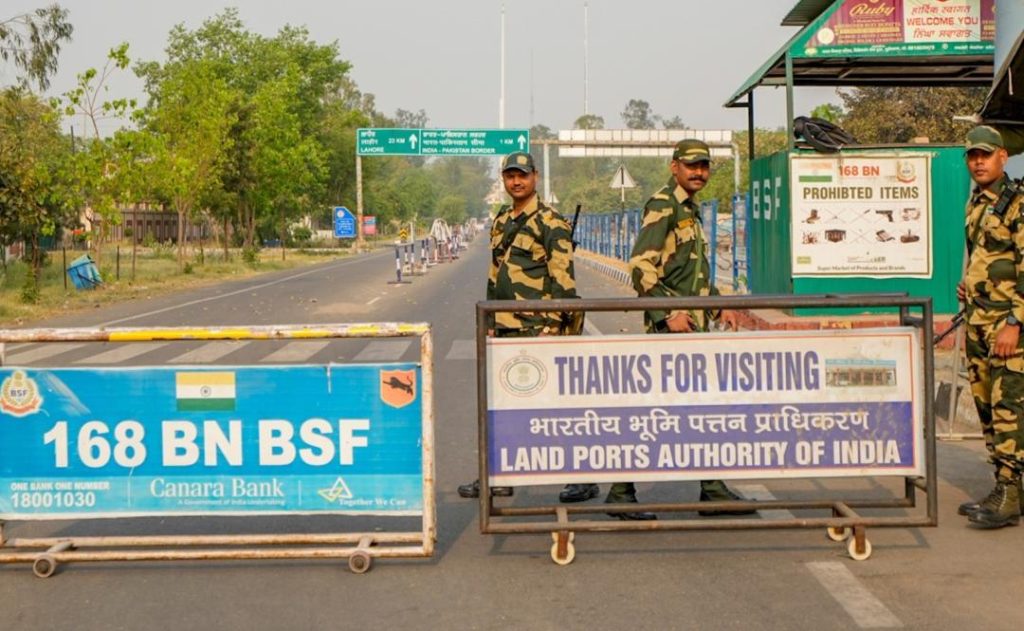
Attari-Wagah Border between India and Pakistan Completely Closed
The Attari-Wagah border, which connects India and Pakistan, was completely closed on Thursday, according to a report by PTI. This development comes after Pakistan had earlier shut the border and stopped accepting its citizens who were deported by India.
The mass deportations of Pakistani nationals by India followed a recent terror attack in Pahalgam, Jammu and Kashmir, which claimed the lives of 26 tourists. The incident had sparked widespread outrage and anger among the Indian public, leading the government to take stern measures to prevent any future attacks.
The Attari-Wagah border, which is one of the most heavily guarded borders in the world, has been a flashpoint for tensions between India and Pakistan for decades. The two countries have a long history of conflict, and the border has seen numerous instances of violence and aggression.
The closure of the border is likely to have significant economic and social implications for both countries. The border is a major trade route, and thousands of people cross it every day to conduct business, visit family and friends, or seek medical attention.
The decision to close the border is also likely to have political implications. India and Pakistan have been engaged in a diplomatic standoff since the Pahalgam terror attack, with each side accusing the other of supporting terrorism.
Pakistan had earlier accused India of violating the terms of the 1974 Indus Waters Treaty, which governs the sharing of river waters between the two countries. India had responded by saying that Pakistan was not complying with the treaty and was instead using the water resources to support terrorism.
The closure of the border is likely to add to the tension between the two countries, and it remains to be seen how the situation will unfold in the coming days.
Background to the Closure
The Attari-Wagah border was opened in 1999, after a ceasefire agreement was signed by India and Pakistan. The border was initially closed in 2000, but it was reopened in 2002 after a deal was reached between the two countries.
Since then, the border has been open to pedestrians, traders, and tourists. However, there have been numerous instances of violence and aggression along the border, including the 2019 Pulwama attack, which killed 40 Indian security personnel.
In the aftermath of the Pahalgam terror attack, India had deported a large number of Pakistani nationals who were found to be involved in the attack. Pakistan had responded by saying that India was violating its sovereignty and international law by deporting its citizens without due process.
The Indian government had responded by saying that the deportations were necessary to prevent future attacks, and that Pakistan was not doing enough to prevent its soil from being used for terrorist activities.
Impact of the Closure
The closure of the Attari-Wagah border is likely to have significant economic and social implications for both countries. Here are some of the potential impacts:
- Trade: The border is a major trade route, and the closure is likely to disrupt the flow of goods and services between the two countries. This could lead to shortages of essential items, including food and medicine.
- Tourism: The border is a popular tourist destination, and the closure is likely to impact the tourism industry in both countries. This could lead to job losses and economic hardship for local communities.
- Family Reunions: The border is also a major route for family reunions, with thousands of people crossing every day to visit their family and friends. The closure is likely to cause significant distress for those who are separated from their loved ones.
- Medical Care: The border is also a major route for medical care, with people from both countries seeking medical attention in each other’s countries. The closure is likely to impact the availability of medical care for those who need it.
Conclusion
The closure of the Attari-Wagah border is a significant development in the already tense relations between India and Pakistan. The border has been a flashpoint for tensions between the two countries for decades, and the closure is likely to add to the tension.
It remains to be seen how the situation will unfold in the coming days, but it is clear that the closure of the border will have significant economic and social implications for both countries. The Indian government has said that the border will remain closed until Pakistan takes concrete steps to prevent terrorism, but Pakistan has responded by saying that India is using the border closure as a form of collective punishment.
In the end, the closure of the Attari-Wagah border is a reminder of the need for dialogue and diplomacy between India and Pakistan. The two countries have a long history of conflict, but they also share a common destiny and a common future. It is time for the two countries to work together to find a solution to their differences and to build a more peaceful and prosperous future for their people.






